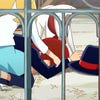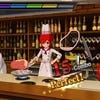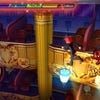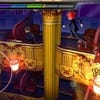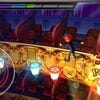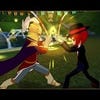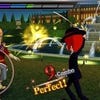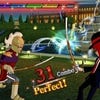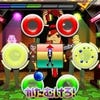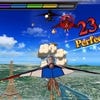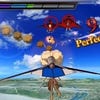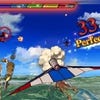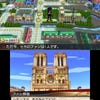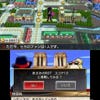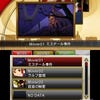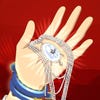Game of the Week: Rhythm Thief and the Emperor's Treasure
One night in Paris.
Poor old George Lucas. It's easy to forget that in 1997 he used computer technology in a way that arguably enhanced the original Star Wars trilogy (leaving Greedo and that dodgy bit with Han Solo walking on Jabba's tail aside). I watched those films at the legendary THX-equipped "Wycombe Six" cinema in the town of my birth, and remember loving every cleaned up frame, fade and transition.
But then, it is easy to forget that, and the reason why is because over the last 15 years Lucas has barely paused in an apparently relentless campaign of tinkering, tampering and, of course, franchising. We like to imagine Lucas sat behind a desk in an office piled high with pod racers, Trandoshans and Crystal Skulls, while a succession of increasingly unlikely marketing executives file past with licensing contracts for him to sign.
The frustrating thing is that surely at this point we should be safe? There isn't much more damage left to do to the original trilogy - touch wood - and if he wants to spend the next decade and a half updating the prequel trilogy then he's perfectly welcome to do so. He can't exactly make the scene where Natalie Portman and Hayden Christensen fall in love next to a fire any worse, after all. And let's not talk about the one where they cavort with a space cow.
But apparently we're not safe. Not while there are more "Yodafone" adverts to get paid for, or while there are lucrative video game tie-ins to negotiate.
You can understand why Microsoft wanted a Star Wars game for Kinect - Jedis were the original controller-free players, waving their arms around to throw rocks, crush throats and hurl lightning - but it hasn't really worked out well for either party. For Microsoft, it's another game that highlights the lag inherent to Kinect controls that so frustrates core gamers, and for Lucas it's another royalty cheque attached to something that makes people laugh at the universe he created. This time it's thanks to Darth Vader dancing like a tit.
Weirdly, as it turns out, the fabled "Galactic Dance-Off" mode in Kinect Star Wars is one of the best things about it. "It's silly, camp and - perhaps not unrelated - the only part of Kinect Star Wars that feels like a throwback to the Star Wars of the 1970s, back when it was a genuine mainstream pop phenomenon embraced by all and not a nerd ghetto swamped by its own pompous mythology," Dan Whitehead wrote in our Kinect Star Wars Review. But it wasn't enough. "Kinect Star Wars is an incoherent and clumsy compilation, one driven more by brand synergy than any creative imperative."
Maybe Lucas will stop now. Of course he won't.
Some memories are better best forgotten, then, although there's fat chance of that happening in a world of reboots. They're not all bad, though, as this week's Devil May Cry: HD Collection proves, although that's only because the strength of the original content manages to transcend the quality of the conversion. "Like most Capcom oldies given the HD treatment, Devil May Cry HD is a job done the simplest and quickest way - that is, the original assets are displayed in higher resolution and in widescreen, but minimal work is done on the assets themselves," Rich Stanton noted in our Devil May Cry: HD Collection Review.
But despite this, and despite a wobble in the middle, the HD Collection still has Devil May Cry 1 and 3, and that's enough. "As a package it offers two fighting games of exceptional quality, with Devil May Cry slick and stylish enough to overshadow its creaky camera, and Devil May Cry 3 still one of the genre's highpoints."
Neither game is our Game of the Week, though, because that accolade goes to a 3DS title which calls to mind fonder memories while creating new ones.
Game of the Week: Rhythm Thief and the Emperor's Treasure
Western developers like Sony Studios London, Harmonix and Neversoft would eventually bring the music game genre to mass market attention - albeit not forever - but the Japanese have been doing interesting things with it for much longer. Masaya Matsuura gave us PaRappa The Rapper way back in 1996, Tetsuya Mizuguchi fused music to dancing, shooting and puzzling with games like Space Channel 5, Rez and Lumines, Sega caught the bug and delivered Samba de Amigo, and Nintendo has given us some intriguing examples, too, like the marvellously lunatic Donkey Konga.
One of our favourites was the DS title that would later make its way west in adapted form as Elite Beat Agents. The original Osu! Tatakae! Ouendan was about striking dots within collapsing circles in time to a furious beat, and occasionally scrubbing the screen madly, while bizarre comic narratives unfolded on the DS' top screen.
Rhythm Thief and the Emperor's Treasure, from Sega, is cut from a similar cloth, but as a game in a post-Layton world it's also bonded strongly to a single story - a rather enjoyable one that sees Raphael, an infamous Parisian thief, exploring the French capital in a Da Vinci Code-style burglary crawl on the trail of his missing father.
"The simplest of your tasks work the way the mechanics of a very simple adventure game might, as you record various sounds to get past various obstacles," Christian Donlan explains in our Rhythm Thief and the Emperor's Treasure Review. "Beyond that, there are also little pattern-matching sections as you bust open ancient locks and deactivate security terminals, and then you get to the main events: a range of over 40 action sequences in which Phantom R - and occasionally other members of the quirky cast - work their way through extravagant set-pieces by matching beats."
It's the sort of game that brings to mind a lot of things we've loved and championed over the years, but does so in a way that feels fresh and exciting. Or, as Donlan puts it, it's "stylish, personable and effortlessly idiosyncratic". Sounds like just the ticket.






